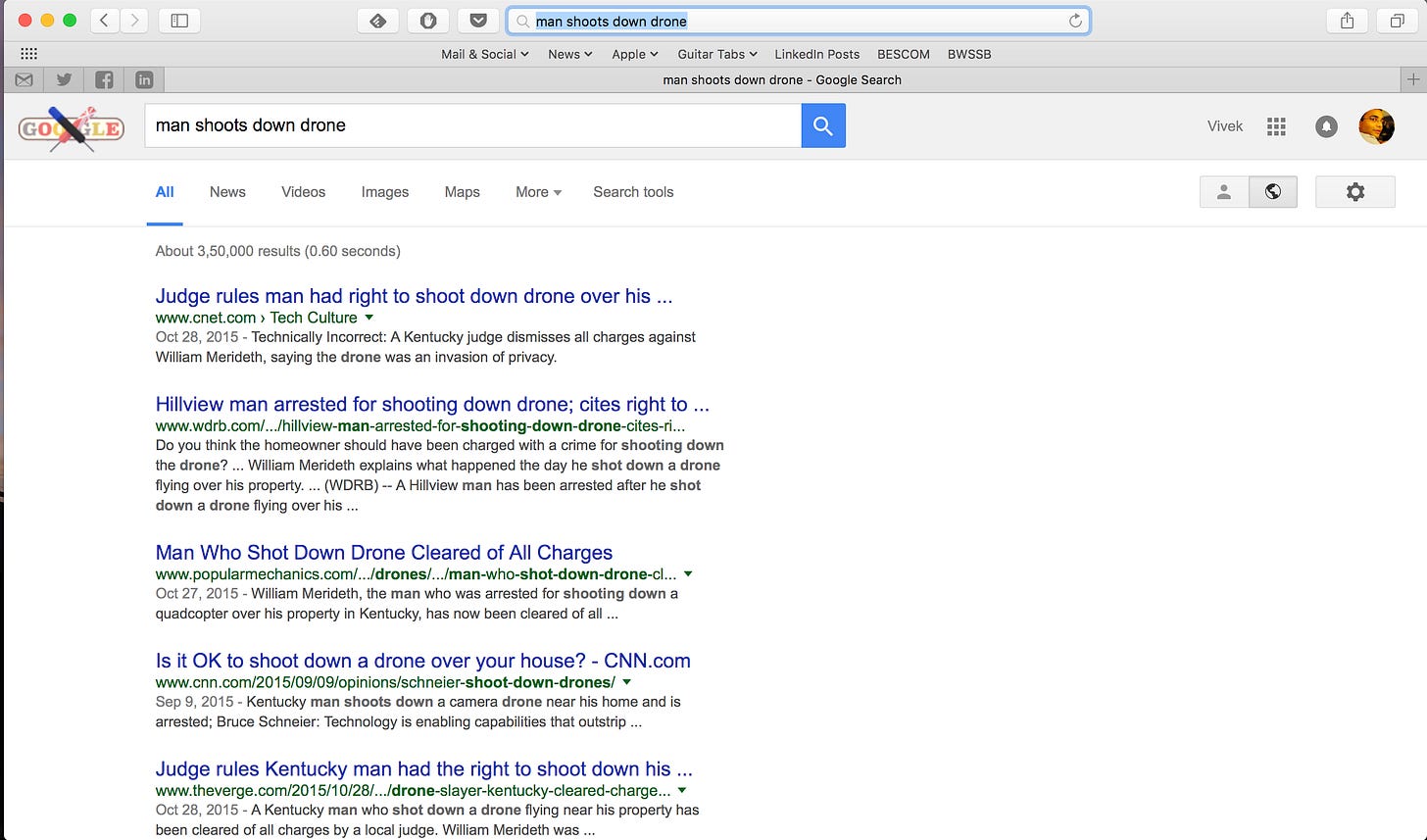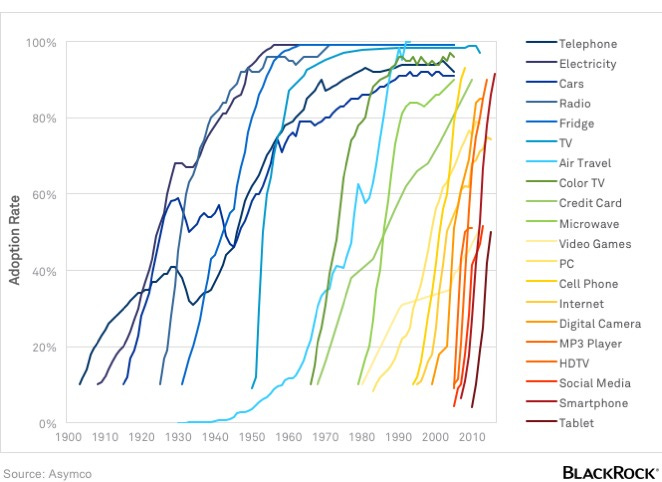Law is being disrupted
The law does not care about right and wrong. It cares about intention.
That is why a murderer can claim temporary insanity and plead not guilty.
The trouble with law is that it is defined with a set of assumptions in mind. Every once in a while there is a change, a disruption, a paradigm shift, that uproots those set of assumptions completely.
It is safe to say that most of the laws across the world were written before Internet became a part of our lives. I would wager, perhaps 99% of them. Consequentially, almost all of the business models that seem to be materialising everyday and becoming a part of our daily lives are constantly challenging the law. While the popular media thinks of this as business model disruption, it is in fact, legal disruption. It is the law that is being challenged and since law moves slowly, often, law is not even aware of it. Well, it is about to be shaken out of its comfort zone.
In order to understand how law is being disrupted, we need look no further than the shared economy businesses. Every single business that I have come across in the shared economy space disrupts the law.
I have had the privilege of setting up several businesses during my career. In Karnataka, one requires about 120 licenses to go from land to having a running hotel. This process normally takes about 5 years and happens in concert with the development of the property. Today, if I have a few vacant apartments, I can technically start a lodging business through Airbnb. I do not require any kind of license, nor do I require to really disclose or run it as a legal entity.
The intention of the law is to protect the customer who stays at the hotel, this is precisely the reason, fire exit plans have to be displayed on the door of every room, etc. When you consider Airbnb, this kind of protection is not mandatory and it all depends on the dedication of the landlord towards his/her tenant whether this information is made available or not. This is just one of the laws I am referring to, and the problem that I am referring to is real, globally. I have myself stayed at places which are in sharp contrast. There have been landlords who have served 20 page manuals on how each system works in the house. I have also had situations where I have been left fiddling with 4 remotes figuring out how to switch on the TV.
Although the intention of Airbnb is not to disrupt the law, it is an unforeseen consequence of the rate at which these businesses grow. There is no country in the world, where the law can keep up with this rate of change.
Uber is another prime example of how the structures and frameworks which have been active for years have been decimated throughout the world. In United States, France, Kenya, India, China; every country that the company has entered, they have faced problems with the law. The reasons might have been different but the challenges have been constant.
Uber is a platform that connects customer to individual drivers who chose to be available on the app at their own free will. The way Uber looks at it, they are connecting demand and supply and bear no further liability with regards to the service being offered. But unions and governments have been hard pressed to see it the same way. This is because many of these drivers are undertaking this work on a full time basis and acting like employees but are devoid of the benefit that employees have. This is a grey area in the law because the law was never defined for contract workers working at such scale! Internet and smartphones did not exist, so the thought never cross the minds of any lawmaker.
So far as I know there is no country in the world, which has a comprehensive law or framework to deal with Uber.
Extrapolate this to any business. Sharing clothes or selling used clothes online, who guarantees quality? How do you protect the consumer?
Take startups that promise to deliver home cooked food. Who certifies the food? There is no centralised kitchen. A cook might cook once and never again; they are sure as hell not going to be ‘fssai' certified.
Law is being challenged time and time again. The scale of the offence is too small to enable enforcement and the scale of the impact is too large to completely ignore it.
What next?
The next frontier of legal disruption will happen when we start using the third dimension of our world more effectively.
The colonial expansion brought about property rights when companies and monarchies needed a means by which they could carve out their colonial possessions. Property in this case mostly meant land, which was often measured in terms of area. Physics and lack of steel kept the buildings mostly around two stories tall. As building materials and construction technology evolved it became possible to build vertically up and most cities have a Floor Area Ratio (FAR) which constrains how high the buildings can go. Bangalore has an FAR of 3.25 while Hong Kong has an FAR of 15, because the number of residents are high and the land area available is quite limited.
But what about the air above the building? Who owns it?
Most of the air space above a country is regulated by the government. In India we have the Director General of Civil Aviation, in the US they have Federal Aviation Administration; each country has its own version of this body. They work pretty well for the regulation of the flights that pass over the country. Anything that can be detected on the radar is administered by them and must follow the rules and safety procedures laid down by them.
Enter Drones.
Very few drones even have a radar signature. To compound matters, they can be bought and flown by anybody. In fact kids can sit in their garage and put together mini drones. It may not seem like this is going to be a source of great nuisance at this point of time, but over the course of the next 5 years they are going to be buzzing all over the place.
A quick search on the internet would give you hundreds of stories about how civilian drones crashed or got shot down by someone for flying over their property.

Look at the contrast in the first two stories. Two cases, two outcomes.
So the question of ownership of land is very clear. But who owns the air above it? And how much of the air do you own? When is it legal for me to defend my privacy and shoot down a drone? How close should it be? Currently there are a lot of conflicting rulings on the matter in the US. But how is the law supposed to treat it? There are no laws precisely covering this matter, but there should be.
The problems with getting bills put together and signed by the lawmakers is that it takes a long time to get this done.
So what?

Technology adoption follows what is called an S-Curve. If you look at the figure above, the refrigerator took almost 35 years to go from 0% to 100%, just for comparison look at the figure below. The technologies of today are being adopted at unprecedented rates because internet has made information dissemination faster and e-commerce has made distribution much easier. This has made it such that the adoption cycles have shrunk to a matter of single digit years. They are vertical lines instead of being the usual S-Curve.

Tesla Model3 launched on 31st March and booked 232,000 orders globally in 24 hours. Suzuki India sells that many cars in an entire year in India (across models). Tesla has a small feature called auto-drive which allows the car to drive on auto-pilot on highways. US is still struggling to put laws together for the same, in India forget about any law arriving till 2030.
Law is unprepared to handle disruption.
Why is this essential?
Look at Uber. Their strategy across the world has been to listen to what the legislators have to say and continue with their operations as they chose to. If they knew the laws were being formulated by transparent consensus than through lobby would they dare to?
So what is the way forward?
Smaller countries and cities are showing the way forward.
Mexico City is crowdsourcing its constitution using Change.org. 9 Million residents are engaged in an experiment in digital democracy and drafting a new constitution for the city. It is not clear cut though, the constitutional assembly is under no obligation to accept the inputs. It is extremely important to setup methods of this nature to source laws of the future.
We can look at examples of how to administer better and speed up the process. Estonia is disrupting citizenship!
Estonia is a small European Union country located on the border of Russia with a population of just 1.3 Million (Delhi is 20X bigger). The country has been treading at the cutting edge of technology in terms of making governance work for them. They have turned Citizenship as a Service (CaaS). The country offers an e-Residency program that allows for any individual, anywhere in the world to become an e-resident. This gives them an opportunity to setup business in Estonia without the requirement of having to be in the country. You can have a European Union entity to run business with at a mere fraction of the cost of travelling to the place. Without a shade of doubt, Estonia has the best e-governance platform in the world and they are exploring ways and means by which this can be made accessible to other countries as well.
The purpose of the law is to provide a framework to govern.
The only way for the governments to keep up with the rate of change is to make sure that the governing frameworks are determined by a process that is much faster and nimble and can accommodate for changes as and how the situations may demand. Currently, such frameworks do not exist, but the need for it is becoming more and more inevitable.
The time has come when governments across the world begin to think about lawmaking as a service. Imbuing the process with greater speed and efficiency, taking the process online and making the process more participative. It is better that the steps are taken now rather than waiting for a day when government is disrupted.



